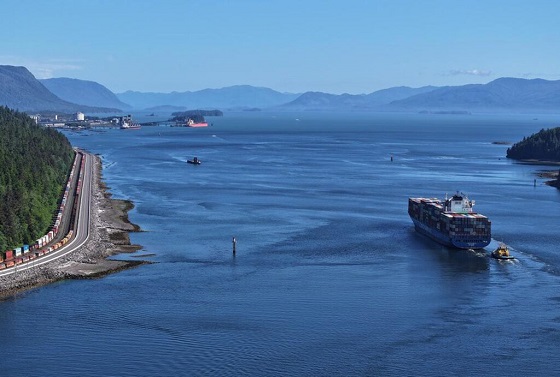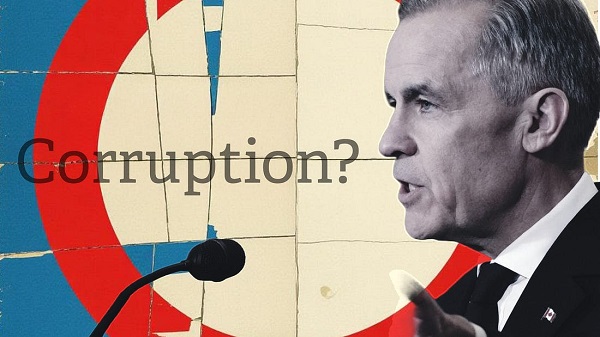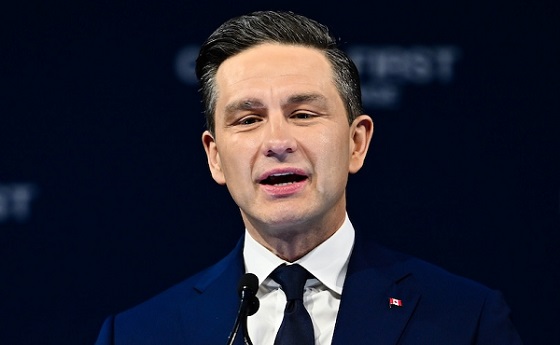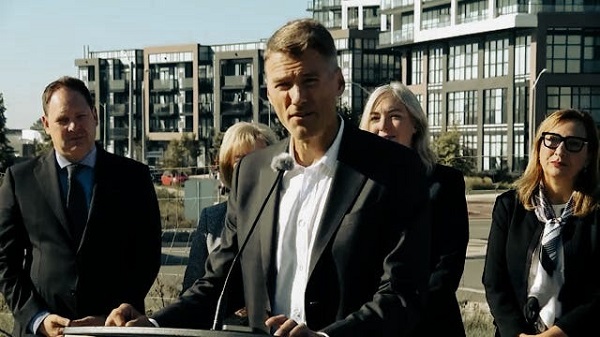Energy
Trudeau’s climate chief threatens Saskatchewan’s Scott Moe for refusing to collect carbon tax

From LifeSiteNews
Moe, however, has refused to be intimidated by Guilbeault’s threats, telling media this week that the carbon tax “is driving inflation and we still are paying a good chunk in other areas and the position from the government of Saskatchewan’s perspective hasn’t changed nor will it change. It should be removed on all products for all.”
Trudeau’s Liberal Environment Minister Steven Guilbeault has threatened to take “measures” against the premier of Saskatchewan for refusing to collect the federal carbon tax on home heating in his province.
On March 4, Guilbeault condemned Saskatchewan Premier Scott Moe’s decision not to collect the carbon tax on home heating in the western province. Moe’s decision came after Prime Minister Justin Trudeau’s government gave a carbon tax exemption on home heating oil, a break that almost exclusively benefits the Liberal voting Atlantic provinces.
“If Premier Scott Moe decides that he wants to start breaking laws and not respecting federal laws, then measures will have to be taken,” Guilbeault told reporters Monday.
“We can’t let that happen. What if somebody tomorrow decides that they don’t want to respect other federal laws, criminal laws? What would happen then if a prime minister, a premier of a province, would want to do that?” he questioned, apparently forgetting his own criminal history.
“It’s irresponsible and it’s frankly immoral on his part,” Guilbeault continued. “We can have disagreements about things like climate change, but to be so reckless is unspeakable, really.”
Beginning January 1, Saskatchewan stopped collecting the carbon tax on electric and natural gas home heating, a move which has already been shown to have lowered the province’s inflation rate.
Moe made the announcement in October after Trudeau suspended his carbon tax on home heating oil, which is almost exclusively used in Atlantic Canada to heat homes, and not in his province.
“I cannot accept the federal government giving an affordability break to people in one part of Canada but not here,” Moe said in a video posted on X at the time.
Moe promised that if the Trudeau government did not provide the exemption provided to Atlantic Canada to the rest of the nation, he would tell SaskEnergy, the province’s Crown corporation that provides energy to all residents, to stop collecting the carbon tax on natural gas. This, Moe said, would effectively provide “Saskatchewan residents with the very same exemption that the federal government has given heating oil in Atlantic Canada.”
Moe’s government has gone as far as introducing legislation to back the scrapping of the federal carbon tax on natural gas. The legislation will shield all executives at SaskEnergy from being jailed or fined by the federal government if they stop collecting the tax.
Despite the popularity and seeming fairness of Moe’s decision, Trudeau’s Liberal government has refused to rule out jail time for Moe if he refuses to collect the carbon tax on home heating.
Moe, however, has refused to be intimidated by Guilbeault’s threats, telling media this week that the carbon tax “is driving inflation and we still are paying a good chunk in other areas and the position from the government of Saskatchewan’s perspective hasn’t changed nor will it change. It should be removed on all products for all.”
Additionally, Conservative leader Pierre Poilievre pointed out that while Guilbeault challenges Moe for breaking the law by refusing to collect the carbon tax, Guilbeault himself has a history of breaking the law.
“Guilbeault calls out Saskatchewan’s lawlessness for refusing to collect his carbon tax,” Poilievre posted on X with a photo of Guilbeault being arrested in 2001.
Guilbeault calls out Saskatchewan's lawlessness for refusing to collect his carbon tax. pic.twitter.com/p3PnwyHzWr
— Pierre Poilievre (@PierrePoilievre) March 6, 2024
While a current member of the Trudeau government cabinet, Guilbeault has a history of taking extreme action in the name of the climate.
In 1997, he joined Greenpeace and served for a time as a director and then campaign manager of its Quebec chapter for about 10 years.
He was arrested many times for environmental protests, the most famous arrest coming after an incident in 2001 when he climbed Toronto’s CN Tower with British activist Chris Holden. The pair hung a banner saying “Canada and Bush — Climate Killers.”
Greenpeace is a group that advocates for population control in addition to calling for an end to all oil and gas use.
Last month, Guilbeault was publicly ridiculed after he said the federal government would no longer fund any road construction projects and instead funnel the savings to “climate change” projects that promote walking instead of driving.
However, Guilbeault’s push for “climate change” regulations are consistent with those of Trudeau. Since taking office in 2015, Trudeau has continued to push a radical environmental agenda like the agendas being pushed the World Economic Forum’s “Great Reset” and the United Nations’ “Sustainable Development Goals.”
The reduction and eventual elimination of the use of so-called “fossil fuels” and a transition to unreliable “green” energy has also been pushed by the World Economic Forum – the globalist group behind the socialist “Great Reset” agenda – an organization in which Trudeau and some of his cabinet are involved.
The reality of Trudeau’s push for so-called renewable energy showed itself just over a month ago after Alberta’s power grid faced near certain collapse due to a failure of wind and solar power. Many called out the Trudeau government’s green energy agenda that is attempting to phase out carbon-based power in favor of “renewables” as the reason for the near failure.
Business
Canada has an energy edge, why won’t Ottawa use it?

Energy abundance, properly managed, isn’t just Canada’s strategic edge—it’s our ace in the hole while allies scramble to rearm their energy systems and competitors sprint ahead. We can keep sleepwalking through the annual ritual of self-imposed shackles, watching golden opportunities slip through our fingers, or we can finally show up as a serious player in the energy security game we’re already knee-deep in.
What the public doesn’t see behind all the climate summit fanfare is a carefully choreographed performance where capitals everywhere scramble to perfect their lines for the UN’s annual pageant. COP30 descends on Brazil in mid-November, and once again Ottawa looks primed to arrive clutching a stack of promises, desperately hoping that thunderous applause will somehow count as tangible progress in the real world.
Thanks to years of bureaucratic capture, our government keeps churning out the measures most fervently demanded by the climate lobby, and this ritual proceeds as if “net zero” were still a credible roadmap rather than a marketing slogan stretched so transparently thin it’s practically see-through. But out in the real world—away from the theatrical staging—the energy system keeps issuing updates of its own that no amount of wishful thinking can erase. The question this year cannot be what flashy new prohibition Ottawa can unveil on cue: are our leaders finally prepared to read the room? Away from the virtue-signalling theatre, countries are quietly adjusting to immovable realities: demand keeps climbing, reliability actually matters, and security trumps sermonizing—and we should be looking south to see what’s really working.
From 2005 to 2023, U.S. per-capita CO₂ emissions from energy plummeted by nearly a third. Not because of performative pledges or green grandstanding, but because coal quietly gave way to natural gas, with renewables filling in around the edges where they actually made sense. Pick almost any grid that made this pragmatic switch, and you’ll discover the same inconvenient pattern that climate absolutists prefer to ignore: fewer emissions and electricity you can actually count on when you flip the switch. Maryland serves as a clean example, where coal shrank from the backbone to a footnote as gas surged, helping keep the lights blazing when people needed them most.
Canada should pay very close attention to these uncomfortable truths. We benefit from hydro and nuclear in some regions, but what the green lobby doesn’t want to acknowledge is that our electricity demand is climbing relentlessly. Population growth alone would guarantee that outcome. Add the explosion in AI technology and it becomes utterly unavoidable, despite the silence from environmental groups. Even the cheerleaders of the new digital economy are brutally honest about this reality when pressed. The head of the world’s biggest AI chipmaker isn’t jesting when he bluntly tells the U.K. it will need gas turbines alongside nuclear and renewables to power its tech ambitions—inconvenient facts that shatter green fairy tales.
Another stubborn reality that doesn’t make it into climate summit speeches is that the International Energy Agency estimates oil and gas companies spend roughly half a trillion dollars every year just to keep output flat—a financial reality that exposes the “stranded assets” narrative as wishful thinking. Without this continual reinvestment, U.S. shale would crater within a single year. It’s rather difficult to describe that as a system drifting quietly into retirement, rather than an industrial backbone that still carries most of the load while activists pretend otherwise. If you’re Canada, that looks less like a looming problem than a golden opening that our competitors are already seizing.
Geopolitics is saying the same thing out loud, for those willing to listen beyond the climate activism echo chamber. J.P. Morgan bluntly calls this the “new energy security age,” and Europe is working frantically to end its dependence on Russian LNG—not for climate reasons, but for survival. Japan is expanding its LNG fleet, and Mexico is inking billion-dollar supply deals while climate campaigners aren’t looking. Strip away all the green branding and virtue-signalling, and you get a core calculation that energy security is nothing short of national security—and countries that get snookered by activist rhetoric into forgetting that harsh reality lose far more than bragging rights at international summits.

The Woodfibre LNG site is seen on Howe Sound in Squamish, B.C. THE CANADIAN PRESS/Darryl Dyck
Our allies have been leaning on us to quit sitting on the sidelines and deliver something concrete. And back home, even Ottawa’s mandarins are finally muttering what everyone else has known all along. For the next several years, at minimum, gas remains the most economical, rock-solid baseload option across vast stretches of the continent. Meeting that surging demand would deliver high-paying jobs, bulletproof alliances, and slash global emissions compared to the world burning more coal. Turning our backs on it means standing idle while rival producers rush to fill the void—all so we can pat ourselves on the back for warming the bench.
If this strikes you as abstract theorizing, cast your eyes toward California. A righteous crusade to shutter refineries didn’t magically eliminate the appetite for fuel—it simply exported the dirty work elsewhere, shipping out the jobs and the supply cushion that shields consumers from price shocks. The Golden State now scrambles like a panicked shopper whenever supply chains hiccup, because when push comes to shove, affordability draws the hard red line on what voters will tolerate. Meanwhile, the global landscape has shifted dramatically, with the United States now claiming the crown as top exporter of refined petroleum and LNG.
The lofty rhetoric of “climate solidarity” has quietly faded into something far more practical—nations ruthlessly pursuing their own interests. Even the most progressive speechwriters now pepper their drafts with buzzwords like ‘pragmatism’ and ‘realism.’ It represents nothing short of a grudging acknowledgment that wishful thinking won’t keep the lights on when the grid starts groaning.
British Columbia, meanwhile, sits perched atop the Montney—one of the continent’s most spectacular gas reservoirs—boasting the shortest shipping lanes to Asian markets. Indigenous nations are shrewdly securing equity stakes in LNG ventures while demanding genuine partnership—a blueprint that marries reconciliation with cold, hard prosperity. Those outbound cargoes are displacing coal-fired power overseas. If your genuine goal involves slashing real-world emissions, that achievement trumps a dozen flowery Ottawa press releases.
So no, the magic formula isn’t “all of the above,” but rather “the best of the above.” It demands deploying hydro, nuclear, and renewables where they deliver maximum punch, with natural gas serving as the indispensable bridge that keeps systems humming while breakthrough technologies mature. We must construct infrastructure that performs when sidewalks turn into skating rinks and when asphalt starts melting like butter.
We’ve also absorbed some hard-earned lessons about the political theatrics that spook serious capital. At COP28 in Dubai, then–environment minister Steven Guilbeault sported a baseball cap emblazoned with “emissions.” Emissions cap—catch the clever wordplay? The joke bombed spectacularly with investors. The policy proposal fared no better; its most vocal champion is reportedly eyeing the exit door, while nearly a hundred Canadian oil and gas CEOs have now fired off two blunt open letters to the new prime minister, spelling out precisely what the cap would accomplish: driving investors to pack their bags for friendlier jurisdictions. If your economic blueprint hinges on attracting capital, avoid crafting policies that essentially scream ‘beat it.’

World leaders at COP29 in Baku, Azerbaijan.
Energy abundance, properly managed, isn’t just Canada’s strategic edge—it’s our ace in the hole while allies scramble to rearm their energy systems and competitors sprint ahead. We can keep sleepwalking through the annual ritual of self-imposed shackles, watching golden opportunities slip through our fingers, or we can finally show up as a serious player in the energy security game we’re already knee-deep in.
What would that look like at COP30? It would sound nothing like the strangely self-defeating Canadian speeches of years past, which have been heavy on confessional hand-wringing, light on genuine intent, drowning in performative self-flagellation, and starved of actual competence. If Ottawa wants to prove it has finally woken up from its ideological slumber, it should ditch the tired theatre and roll out policies that actually unleash investment instead of strangling it: streamlined approvals with firm timelines that mean something; predictable fiscal treatment that doesn’t shift with every political breeze; a clear path for Indigenous equity in major projects; and an explicit commitment to “best of the above” power and fuels. Pair that with a forthright message to allies that cuts through the usual diplomatic fog: Canada intends to supply reliable, cleaner energy to the democracies that desperately need it.
It’s not capitulating to industry to stop pretending we can wish away reality. It’s the path that lets us grow the economy, slash global emissions faster than sanctimonious lectures ever will, and strengthen the alliances that keep free countries from getting steamrolled. If we want Canada to matter in this new energy security age instead of being relegated to the sidelines, we should start acting like we mean business. COP30 is the stage. Time to scrap the old script and write one that actually works.
Energy
Prince Rupert as the Optimal Destination Port for an Alberta Crude Oil Pipeline –

From Energy Now
Assessing the Strategic, Economic, and Environmental Advantages on British Columbia’s Northern Coast
With ongoing discussions about diversifying Alberta’s crude oil export routes, selecting the right destination port on British Columbia’s northern coast is critical. This analysis examines Prince Rupert as a prime candidate, highlighting why it stands out as the best choice for a new Alberta crude oil pipeline.
Geographic and Logistical Advantages
Prince Rupert is Canada’s deepest natural harbour and is located approximately 1,500 kilometres closer to Asian markets than Vancouver. Its northern coastal position provides a shorter and more direct shipping route across the Pacific, reducing transit times and shipping costs. The port’s location also means ships can avoid the congested and environmentally sensitive waters of southern British Columbia, including the Salish Sea and Vancouver’s busy port.
Infrastructure and Expansion Capacity
Prince Rupert has a modern and rapidly expanding port infrastructure. The Port of Prince Rupert already handles bulk cargo, containers, and other exports, and it has significant capacity for further development. There is available land and established transportation corridors—including rail lines operated by CN Rail—that connect directly to Alberta, making it logistically feasible to construct a new pipeline and efficiently move crude oil to tidewater.
Economic Benefits
A pipeline terminating at Prince Rupert would open up Alberta’s crude oil to global markets, particularly in Asia, increasing market access and potentially securing better prices for Canadian oil producers. The economic spin-offs for both Alberta and northern British Columbia include job creation, increased tax revenue, and local business opportunities in construction, operations, and port services.
Environmental and Community Considerations
Shipping crude oil from Prince Rupert avoids some of the most ecologically sensitive regions along the southern coast. The port’s deep waters allow for safer navigation of large tankers, reducing the risk of groundings and spills. Additionally, the relatively low population density around Prince Rupert compared to southern ports minimizes the social impact and opposition that has historically challenged energy projects in more urbanized regions.
Strategic and Security Factors
The northern location of Prince Rupert is advantageous from a national security perspective. It is less vulnerable to geopolitical tensions and traffic bottlenecks that can affect southern ports. The port’s proximity to the open Pacific also reduces the time tankers spend in Canadian waters, limiting exposure to potential environmental incidents.
Prince Rupert’s strategic location, robust infrastructure, economic potential, and lower environmental and social risks make it the best choice for a new Alberta crude oil pipeline on British Columbia’s northern coast. Its selection would not only enhance Canada’s energy export capabilities but also support responsible economic development in Western Canada.
-

 Business2 days ago
Business2 days agoFederal Budget 2025: A responsible media would ensure Canadians know about the dismal state of federal finance
-

 Business2 days ago
Business2 days agoCanada has an energy edge, why won’t Ottawa use it?
-

 International1 day ago
International1 day agoPoland’s president signs new zero income tax law for parents with two children
-

 Automotive14 hours ago
Automotive14 hours ago$15 Billion, Zero Assurances: Stellantis Abandons Brampton as Trudeau-Era Green Deal Collapses
-

 Alberta2 days ago
Alberta2 days agoDiploma Exams Affected: No school Monday as ATA rejects offer of enhanced mediation
-

 Business2 days ago
Business2 days agoEthics on Ice: See You Next Year
-

 International1 day ago
International1 day agoAustralian territory bans men from women’s prisons in national first
-

 National1 day ago
National1 day agoPoilievre accuses Canada’s top police force of ‘covering up’ alleged Trudeau crimes




